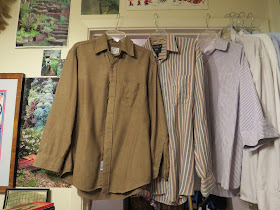LGBT
issues have been in the news and all over social media lately, so an
aspect of life that used to be considered out of the mainstream is
right in the center now. This is helpful to my friends and family
who are LGBT, but it also sheds light on a subject that has
fascinated me since I was a girl in grade school, petitioning for my
school to allow girls to wear pants (especially jeans):
gender-specific clothing.
I
was in grade school in the 60s – in Phoenix. In Arizona. In a
corner of the U.S. that was anything but cutting edge. Our
population was 698,000 in 1965, about four times smaller than it is
now. We were considered the Wild West, and our styles trended years
behind hipper parts of the country. When I was a girl, most of the
women that I saw on TV, in magazines, and in real life were very
feminized, so we girls emulated them. We thought dresses and skirts
were the most wonderful things in the world. But we were in a unique
situation too, because as denizens of the Wild West, we also knew
about Cow Girls. Cow Girls in AZ wore jeans, just like the Cow Girls
in movies and TV.
I
became aware of other women on TV who wore pants, like Laura Petrie on
The Dick Van Dyke Show, and
lady scientists in SciFi movies. Plenty of women in Science Fiction
movies/shows wore skirts too – most notably the cocktail-waitress
outfit the female officers wore on Star Trek.
But the garments under
those uniforms looked like shorts to me. I already wore shorts under
my skirts and dresses because we had P.E. every day at school, and
wearing the shorts under my skirts made it easier to change. That's
what I told myself. But the truth was, I lived in shorts or pants
the rest of the time – it was the clothing I associated with
freedom and adventure. And because of that, I have gradually become
aware that it is also the clothing of power.
To
me, power isn't punching some guy in the face. Power is the ability
to handle your own finances, pursue your own interests, and walk (or
in some cases hike or climb) with confidence in the world. You don't
need your husband to negotiate with a car dealer (though you'll
probably discuss the options with him beforehand), and for better or
worse, you are the mistress of your life. Plenty of women do that in
skirts, often in high heels, and some would argue that stylish
dresses and skirt-suits are the essence of power clothing. I think
that's true in some cases, but not in most.
I
don't want to get in too deep with psychology here, but I feel
traditional women's clothing is not as physically comfortable, and
that seems to be deliberate. It limits your range of movement, and
there is an implied sexual component to it – it's supposed to
enhance your figure and make you look attractive. But what if you
don't want to attract? What if you just want to go about your
business? In some cultures, people try to solve that problem with
shapeless garments that cover you from head to toe. But that's the
opposite of comfortable. Let me tell you about comfortable.
Comfortable
is shoes that you can walk or stand in for long periods of time.
It's jeans that fit properly without being too loose or too tight.
Comfortable is a shirt (or blouse) that fits the same way.
Sometimes that shirt was manufactured for women. But sometimes it
was manufactured for men.
Here's
a photo of my three favorite shirts (currently). Two of them were
manufactured for men – I found them in the men's section at various
Goodwill stores. I would guess that ¼ of the shirts in my closet
are men's shirts.
Back
in the 60s, a gal like me would be called a tomboy – we're
comfortable with our heterosexuality, able to appreciate feminine
clothing, but we're much more likely to wear the jeans and comfy
shirts. We like to hike, garden, paint our own houses, sometimes
even repair our cars and/or appliances. We go to college to pursue
science degrees (among other specialties). We may or may not wear
makeup/dresses/heels occasionally. But we conduct most of our
important business in pants.
I
can't even guess how much of my tendency to do that is due to my
perception of men from the decade I grew up. Men were doctors,
lawyers, school principals, and presidents. I didn't think there was
anything wrong with women doing those things, but at that time, most
of the decision-making jobs were held by men - and they wore pants.
On
the other hand, my mom was divorced, and she was a woman to be
reckoned with, whether she was wearing slacks or dresses. And there
was another factor that must have shaped my love of jeans – the culturally turbulent 60s. Okay, the 70s, too.
That's
when bell-bottoms were in style, for both men and women. I would
wear them today, if they were re-introduced. Alas for me, I can't
resist the Groovy Look. Most styles are enjoyed with some level of
delusion. In my case it may be quite high. But for me, the jeans
and the comfy shirts will always be a symbol of the control I assert
over my own life.
So
as the discussion about sexuality, gender, and gender identity (or
even the choice not to
have a gender identity) continues to unfold, it will be interesting
to see how clothing styles evolve. Whatever happens – I'll keep
haunting Goodwill for my favorite stuff, regardless of how the aisles
are classified.




No comments:
Post a Comment